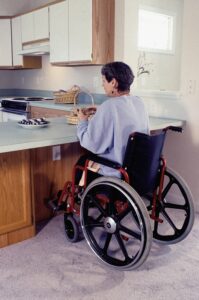Disabled people living without home adaptations have worse outcomes, study finds
Older people with mobility problems living without home adaptations have poorer health and higher levels of pain, according to new research from the Universities of Manchester and Hong Kong.
The new study, published in Lancet Regional Health Europe, also links the lack of adaptations with not being able to participate in social activities and having to move home within two years.
‘We now have strong and consistent evidence that housing adaptations can prevent a deterioration in the health, wellbeing, and quality of life of disabled older adults,’ said lead author Honorary Professor Tarani Chandola, from the University of Manchester.

The analysis, funded by the Economic and Social Research Council, followed over 10,000 adults aged 60 and over living at home in England for an average of 11 years using data from the English Longitudinal Study of Ageing.
The team compared older adults with and without mobility impairments living in homes that had been accommodated to their disability or that had remained unadjusted.
Among those with severe mobility impairments, home adaptions reduced the probability of falls by 3%, pain by 6%, and poor health by 4% compared to disabled adults coping without help.
Modifications for external access also increased the chances that people could go out of their home and participate in social life by 6% and enabled them to remain in their home for at least the next two years by 4%.
The adaptations they studied included widened doorways, access ramps, automatic doors, accessible parking, handrails and bathroom or kitchen modifications.
Professor Chandola added: ‘Mobility impairment is the most prevalent form of disability facing older adults today and includes difficulty in walking, climbing stairs, and getting up after sitting.
‘But most of the housing stock in the UK is poorly designed for a rapidly ageing population, with only 7% of homes in England in 2014 meeting the minimum standard of accessibility.
‘Over 70% of older adults with a mobility impairment in England live in a home without an accommodation for their disability.’
In related news, a Bill that will see British Sign Language (BSL) become a recognised language in Britain has cleared its final hurdle on the way to becoming law.
Photo by CDC















